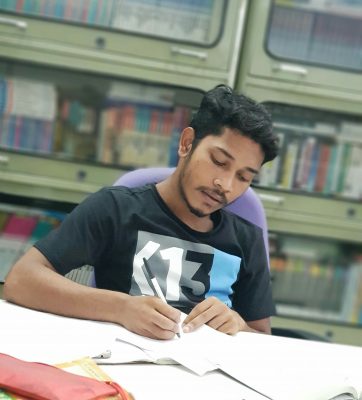
Photo provided by Mangu Purty
As part of a new social media campaign to celebrate linguistic diversity online throughout Asia, every week a different language activist and advocate will be taking turns managing the @AsiaLangsOnline [1] Twitter account to share their experiences with the revitalization and promotion of their native languages. This campaign is a collaboration between Rising Voices [2], the Digital Empowerment Foundation [3], and the O Foundation [4].
Each week, the upcoming host will answer several questions about their background and will give a brief overview of their language. This Q&A is with Mangu Purty (@ManguPurty [5]) who will provide a sneak preview of what he will be discussing during his week as host.
Rising Voices: Please tell us about yourself.
I am an undergraduate student, studying Chinese language. I'll be graduating in 2020. I come from Southern part of Jharkhand, which is a Ho speaking area.
RV: What is the current status of your language on the internet and offline?
Currently, the Ho language exists online only in the form of informal chat and video songs. All available material is mostly in Latin/Devanagari/Odia script. Other than that, there is no written material available on various topics like society, science ,and culture. This is partly due to absence of computer fonts and input tools. Warang Chiti, the script used for Ho is yet to make its presence felt online. Also, there is a lack of awareness regarding the possibility of using Warang Chiti online.
But offline, the situation is much better, though unsatisfactory. Ho is taught till University in Jharkhand. But most important is the primary school stage, where very few schools have Ho teachers. Being primarily a spoken language, Ho is looked down upon by non-native speakers as well as the native speakers. It is a sad fact that economically well off people usually switch to speaking Hindi, which is seen as a prestigious language as compared to Ho. But there is a lot of enthusiasm among Ho youth for the preservation of their language and culture. There have been many rallies and protests in the recent years demanding recognition of Ho language by the Indian government.
RV: On what topics do you plan to focus during the week that you’ll manage the @AsiaLangsOnline Twitter account?
•Ho Wikipedia project.•Creation of Unicode compliant Warang Chiti fonts.•Input methods for Warang Chiti.•Blogs.•Development of terminologies.•Brief history of script and its acceptance in among Ho speakers.•Language activism.•Progress made so far.
RV: What are the main motivations for your digital activism for your language? What are your hopes and dreams for your language?
The main motivation behind all my effort is that I want my language to be equal to all other languages I see around. I hope Ho will make its presence felt in the digital platform. There are more than a million Ho speakers, the language just cannot disappear, we just have to make the right effort.